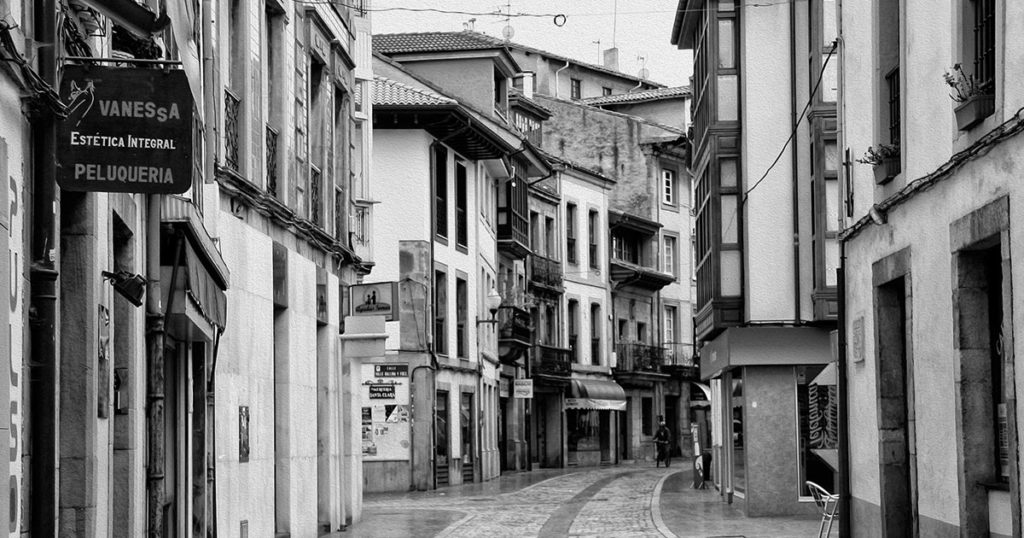
A road twisting through the backstreets of Villaviciosa, where we’d parked the car to start our morning run, took us from one side of the town to the other and then up away from the estuary and toward the houses on the outskirts. Space between buildings, scraggly little yards, and the absence of sidewalks signaled that we were leaving the town behind. Soon we passed a stone mansion and then a stone church, and then more houses, all stone and all close to the narrow road. It was the first weekend in December and in the town center Christmas carols had played from speakers hung along the streets, but on the roads we took, there was no sign at all that it was the season to be merry. It was a wet, gray day, and the best we could hope for was to avoid a drenching—we had already sat out one strenuous downpour in the car before starting, and the trick was to get in our run before the next—and we didn’t tarry but kept at a steady pace. Left or right, my partner asked when the road forked, and I pointed to the narrower, steeper branch. Good, we’re getting the hard part out of the way, was my thought as we kept on, up up up. By the time it was clear our road was fizzling out, we’d gone so far that it seemed to make sense just to keep on. Maybe we’d come out on the other side of the high hills circling the town, close to where we’d left the car.
Exactly when had our road become a paved lane, and then when a hard track, and then a muddy, wet one? We were by then on a trail, not even a track, and when a runner came careening down around a bend toward us, I called out. “Hello! Does this track go anywhere?” He slowed, paused, hesitated, perhaps trying to decide how to interpret the question. I tried again. “Can we get back to Villaviciosa by going on?”
He looked back over his shoulder as if to find the answer on a signpost, then said he was training for a trail race. He added few words we didn’t catch, and then was off again, full tilt. Still in doubt, we kept on. At least the trail was marked, we noticed, with red and blue stripes on rocks, showing it was official, and presumably we weren’t lost in the wooded mountains. With luck, we would follow the trail back to civilization rather than ever deeper into the wilderness. But marked trails can lead you on and on and then stop after delivering you to some remote mountaintop, and we did not want to run for two hours only to discover we’d have to turn around and run two more to get back.
But we were trusting the weather, so why not trust our luck with the trail too? On we went, the climb steeper and steeper, the wind blowing cold where the woods thinned and the track was exposed. The trail was too wet and steep to run fast enough to generate sufficient heat to combat the chill wind. But soon the way leveled off, there were meadows on either side, and I stopped wondering if you could die of hypothermia in 40-degree weather. “As long as we keep moving, I think we’ll survive,” I called ahead to my partner. Still no rain, though the sky was ever darker, and the black clouds looked ominous. Not that the weather was a surprise—we’d had nearly three weeks of rain and were due at least another week of it.
In the open country, we could look down and see that we were above the town, in the process of circling it across the mountain ridges. Then the trail began to snake downward, into wooded terrain, though whether it would lead to Villaviciosa or into another valley we didn’t know. But soon around a curve we came face to face with two runners heading up. Hello! they greeted us, and we answered the same, our voices full of joy, as if we’d seen an albatross.
Our track turned back into a rutted lane and then into a paved road. Shortly after that, the rain came, a stinging deluge that soaked us. The last, drenching 20 minutes was the price of our adventure, though with our safe arrival assured, even a blinding rain was easier than the wind had been. I thought about the couple starting up the mountainside as we were arriving at the bottom. What kind of an adventure were they having? I thought of them again after we’d got back to the car and were drying off. Were they still out on the trail? Did they know where they were going? But I didn’t worry—no one dies of exposure at 40 degrees, I now knew, even with a wind, even in the mud, even in the rain. As for the lone mad runner, I pictured him arrested in mid flight on the rocky trail, twisting to see over his shoulder. Could we make it up what he’d hurtled down? That was what I’d thought the look was about. But perhaps he’d reasoned that our appearance meant he was near civilization. He might only have been checking the black clouds over his shoulder to see if he would beat the rain.

